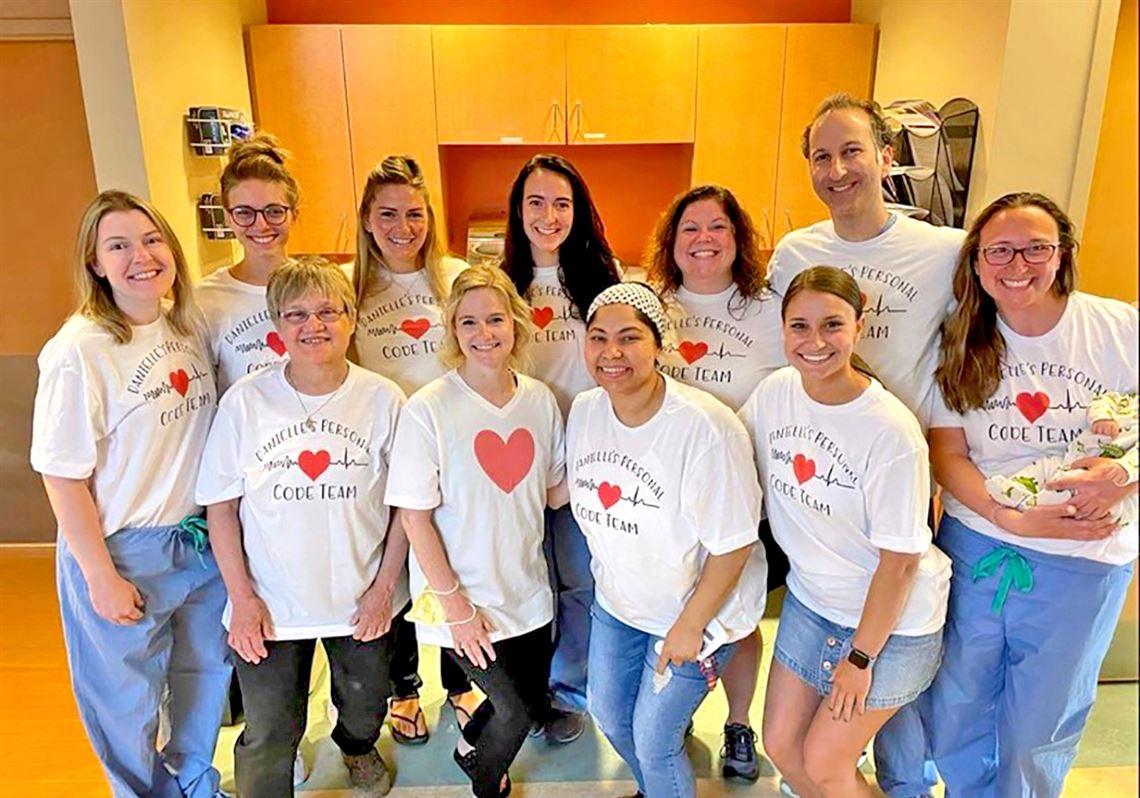Danielle May, a nurse at the University of Pittsburgh Medical Center, was at work when she went into cardiac arrest. She is now on the road to recovery, but she says she might not have survived if it wasn’t for her closest work friends.
Fellow nurse Julia Conroe remembers getting ready to start a 12-hour shift at the hospital when she looked down the hall at May and noticed something wasn’t right. Conroe saw May in a slouched position next to one of the facility’s mobile computers.
“Are you OK? You look like you’ve been crying,” Conroe said.
Both women have spent a lot of time together over the last six years, working countless holidays at the hospital when everyone else wanted the day off. They share a special bond and have come to care for each other in addition to their patients. The besties even wear matching badges at work, Conroe dons a peanut butter jar and May wears a jar of jelly.
While checking up on May at work, Conroe noticed that she had been sweating – not crying. That’s when May said she was going into “SVT” again, which is short for supraventricular tachycardia, a super-fast heart arrhythmia. May experienced cardiac abnormalities on and off for the past six months and all of her “work family” knew.
It was around 7:30 AM at the time. The night shift was technically over and the day nurses, including Conroe and May, were just about to clock in.
Conroe grabbed a chair from behind the nurses station for May to sit in and the overnight charge nurse hurried over to help. But her condition quickly deteriorated. May stopped responding to questions after a couple minutes and when Conroe pushed her back from a slumped position, her skin was gray. She was “no longer there.”
The staff’s medical training quickly kicked in as they rushed to save May’s life. They put on her back and checked for a pulse. When they couldn’t find one, they started doing chest compressions.
But for Conroe, the experience was much more traumatic than taking care of a regular patient. She was pressing the palms of her hands into her friend’s chest, all while wondering, “Is this really happening? When will I ever see my friend again?”
When they still couldn’t find a pulse, an emergency code went off in the hospital and more professionals jumped into action.
An obstetrician and anesthesiologist on the unit rushed into the room to help and asked if May had any cardiac history and everyone in the room responded with a resounding “Yes!”
May was shocked once with a defibrillator and Conroe was eventually relieved from her chest compression duty. She went into the hall to retrieve the next round of medication, but she stopped when she heard her friend crying in the other room.
Conroe rushed back into the room to see her friend was alive and awake. May’s hearing came back next as she started to realize what had just happened.
May recalled being treated for STV just six weeks before she went into cardiac arrest.
“You have less than a 1% chance of having a major cardiac event in the next two years,” her cardiologist said at the time.
While she recovered on the exam table, May heard someone yell out, “Call her husband!” But he was two-and-a-half hours away with the kids at a baseball tournament. That’s when May called out all ten numbers of her husband’s phone number, which shocked everyone in the room.
She was eventually transferred to the ICU while her work family went back to caring for patients.
May is grateful to be alive and credits her work friends with saving her life.
“It’s just a nurse’s way to think of others,” May said. “The first thing I thought of was, ‘Are they OK?’ Because I can’t imagine. That was the beginning of their 12-hour shifts!”
Soon after, a grief counselor visited the ward to help everyone assess their emotions. They also got a chance to talk to their friend on FaceTime while she recovered in the ICU.
May needed constant supervision due to her external life vest. Whenever May’s husband or mother needed a break, Conroe would be her “babysitter.”
“I didn’t want anyone else to have to do anything for you,” she said to May during a recent interview. “I wanted to be the one to take care of you.”
Conroe is now “forever a part” of the May family, which means she was there for their oldest son’s graduation party this spring.
As she mingled with some of May’s relatives at the party, Conroe remembers looking over at her husband and sharing a smile. They both wondered what it would have been like to lose May that day. But now they are grateful to have each other.
“I’m just so thankful for so much, like the fact that I was at work,” May said. “I truly believe everyone who was there that day was supposed to be there.”




